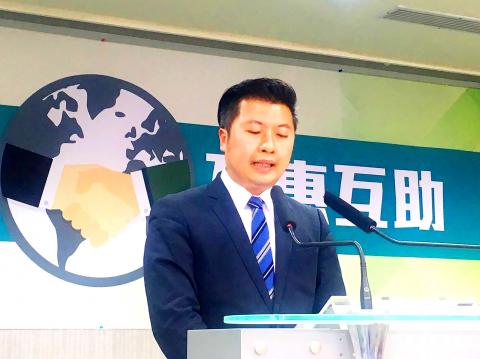China’s failure to respond on the matter of a Taiwanese man missing in China is causing his family “anxiety and panic,” the Democratic Progressive Party (DPP) said yesterday, as it called on authorities to protect the rights of Taiwanese.
Concern has risen in Taiwan about the whereabouts of Lee Ming-che (李明哲), a community college worker known for supporting human rights in China who disappeared on Sunday last week after entering China’s Zhuhai city via Macau.
Chinese authorities had repeatedly said they would protect the rights of Taiwanese in China in accordance with the law, the DPP said.

Photo: Su Fang-ho, Taipei Times
“But after six days, there has been no official response by China to requests for consultations about the search by our government and his family,” DPP spokesman Chang Chih-hao (張志豪) said in the party’s strongest statement yet on Lee’s disappearance.
“This has caused the family anxiety and panic,” Chang said.
The party called on Chinese authorities to respond promptly to requests for cooperation and “effectively protect human rights and not increase the risk of Taiwanese traveling to China,” Chang said.
The Straits Exchange Foundation and the Mainland Affairs Council have said they have been unable to raise a response from their Chinese counterparts over Lee’s case.
Lee’s case raised questions about the safety of people working with civic society in China, Amnesty International’s East Asia director Nicholas Bequelin said.
Lee had been supporting organizations and rights advocates in China for years, but went to China this time for personal matters related to his mother-in-law’s medical condition, Amnesty International said.
“If Lee Ming-che has been detained, then please tell me the charges,” Lee’s wife, Lee Ching-yu (李淨瑜), said at a news conference on Friday organized by the Taiwan Association for Human Rights.
“Please tell her if her husband is alive or dead, where is he,” the rights group said in a statement.

MAKING WAVES: China’s maritime militia could become a nontraditional threat in war, clogging up shipping lanes to prevent US or Japanese intervention, a report said About 1,900 Chinese ships flying flags of convenience and fishing vessels that participated in China’s military exercises around Taiwan last month and in January have been listed for monitoring, Coast Guard Administration (CGA) Deputy Director-General Hsieh Ching-chin (謝慶欽) said yesterday. Following amendments to the Commercial Port Act (商港法) and the Law of Ships (船舶法) last month, the CGA can designate possible berthing areas or deny ports of call for vessels suspected of loitering around areas where undersea cables can be accessed, Oceans Affairs Council Minister Kuan Bi-ling (管碧玲) said. The list of suspected ships, originally 300, had risen to about 1,900 as

Right-wing political scientist Laura Fernandez on Sunday won Costa Rica’s presidential election by a landslide, after promising to crack down on rising violence linked to the cocaine trade. Fernandez’s nearest rival, economist Alvaro Ramos, conceded defeat as results showed the ruling party far exceeding the threshold of 40 percent needed to avoid a runoff. With 94 percent of polling stations counted, the political heir of outgoing Costa Rican President Rodrigo Chaves had captured 48.3 percent of the vote compared with Ramos’ 33.4 percent, the Supreme Electoral Tribunal said. As soon as the first results were announced, members of Fernandez’s Sovereign People’s Party

Japan’s strategic alliance with the US would collapse if Tokyo were to turn away from a conflict in Taiwan, Japanese Prime Minister Sanae Takaichi said yesterday, but distanced herself from previous comments that suggested a possible military response in such an event. Takaichi expressed her latest views on a nationally broadcast TV program late on Monday, where an opposition party leader criticized her for igniting tensions with China with the earlier remarks. Ties between Japan and China have sunk to the worst level in years after Takaichi said in November that a hypothetical Chinese attack on Taiwan could bring about a Japanese

MORE RESPONSIBILITY: Draftees would be expected to fight alongside professional soldiers, likely requiring the transformation of some training brigades into combat units The armed forces are to start incorporating new conscripts into combined arms brigades this year to enhance combat readiness, the Executive Yuan’s latest policy report said. The new policy would affect Taiwanese men entering the military for their compulsory service, which was extended to one year under reforms by then-president Tsai Ing-wen (蔡英文) in 2022. The conscripts would be trained to operate machine guns, uncrewed aerial vehicles, anti-tank guided missile launchers and Stinger air defense systems, the report said, adding that the basic training would be lengthened to eight weeks. After basic training, conscripts would be sorted into infantry battalions that would take